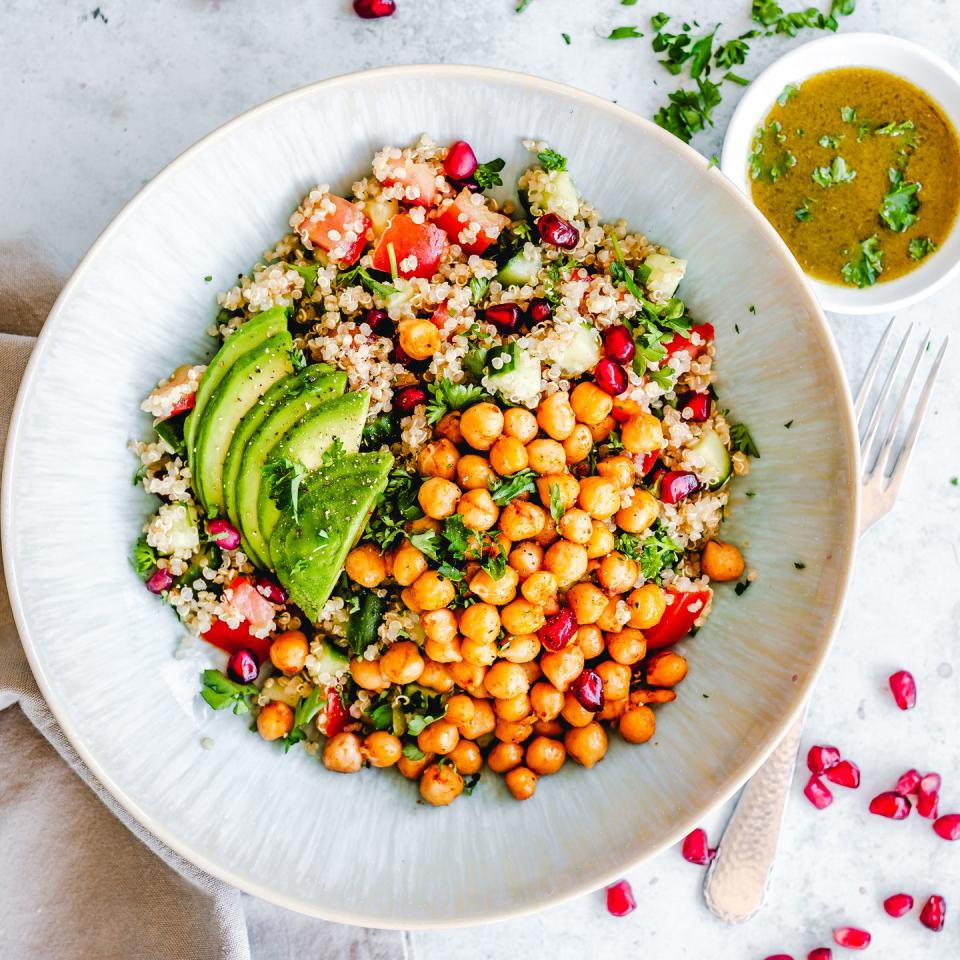Following a Pescatarian Diet Can Reduce Risk of Several Chronic Diseases

If you're looking to eat more plant-based but find making the full switch too difficult, a pescatarian diet may be the right fit for you. This version of a vegetarian diet focuses on plant-based foods and eliminates meat and chicken, but does allow seafood to be consumed.
What is a Pescatarian Diet?
The pescatarian diet stems from a vegetarian diet, focusing on plant-based foods and seafood, but eliminating meat and poultry. Many people chose to become a pescatarian because it allows for a smoother transition to a plant-based diet and can be easier to sustain in the long-term when compared to a vegan diet. Plus, fish is a complete source of protein and has a slew of nutritional benefits. Most pescatarians also include eggs and dairy in their diet, though some do not as this is a personal choice.
The benefits and risks of a pescatarian diet:
Reduces risk of several chronic diseases: Plant-based eating in general is associated with reduced risk of developing heart disease and certain cancers, but fish in particular has several benefits. Research suggests that regular fish consumption can reduce risk of heart disease, stroke, depression, Alzheimer's, and several other chronic diseases. Plus, meat is high in saturated fat, which is known to increase levels of cholesterol in the blood. By eliminating meat from your diet, you can substantially cut back on your intake of saturated fat.
Emphasizes heart-healthy omega 3 fatty acids: Many of the disease-fighting benefits of fish come from its heart healthy omega 3 fatty acids. These healthy fats have been linked to benefitting cholesterol, triglycerides, inflammation, and even blood clotting.
Can help you lose weight: Although not a formal weight loss plan, the pescatarian diet is full of plant-based foods that are rich in nutrients and fiber which can help enhance satiety. Portion sizes are key though for this diet to help you lose weight, as is choosing more plant-based foods and limiting fried/greasy foods that may be high-calorie.
Better for the environment: According to the Environmental Working Group, the carbon footprint of tuna and salmon is significantly lower than cheese or meat.
Excess mercury is a concern: Contaminants can be a concern in any food, but mercury levels in fish are especially an issue for certain populations (think pregnant women, nursing mothers, and young children). The larger fishes tend to have higher mercury levels, including fish species such as shark, swordfish, and king mackerel. Low-mercury fish include shrimp, canned light tuna, salmon, and catfish. If you're a big tuna eater, know that albacore white tuna contains more mercury than canned light tuna.

Pescatarian diet shopping list:
Produce
Fruit: apples, bananas, berries, grapes, oranges, pears, plums, watermelon, etc
Vegetables: asparagus, bell peppers, broccoli, carrots, cauliflower, cucumber, garlic, green beans, kale, onions, potatoes, spinach, tomatoes, etc
Protein
Fish (fresh, frozen, or canned): salmon, cod, trout, swordfish, tuna, sardines
Shellfish: shrimp, scallops, clams
Tofu & tempeh
Veggie burgers (preferably bean/legume based)
Beans & legumes: black beans, chickpeas, kidney beans, lentils, etc
Nuts & nut butters: almonds, cashews, peanuts, pistachios, walnuts
Chia seeds, flax seeds, hemp seeds
Eggs (optional)
Dairy (optional)- Greek Yogurt, low-fat cheese, milk or non-dairy milk alternatives (i.e. almond milk, oat milk, etc)
Grains & Pantry Staples
Brown Rice
Condiments: ketchup, mustard, bbq sauce, sriracha, etc
Dips: hummus, guacamole
Dried spices and fresh herbs
Flour: regular, gluten-free, almond flour, etc
Oatmeal
Maple syrup
Nutritional Yeast
Oils: olive oil, avocado oil, sesame oil, etc
Pasta: regular, gluten-free, chickpea pasta, lentil pasta, etc
Quinoa
Soy sauce
Tahini
Teriyaki Sauce
Tomato Sauce
Vegetable stock
Whole wheat or sprouted grain bread
Pescatarian diet recipes and cookbooks:
If you're new to a pescatarian diet, you'll want to make sure you have the proper resources and tools to make the transition a smooth one. Here are a few pescatarian-friendly resources to get you off on the right foot.
Best recipes:
50+ Vegan Recipes That Are So Good, You'll Forget About Meat and Cheese
15 Fresh and Flavorful Vegan Salads That Will Actually Fill You Up
Best cookbooks:
You Might Also Like


